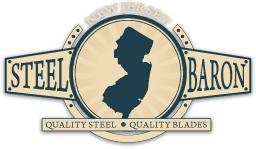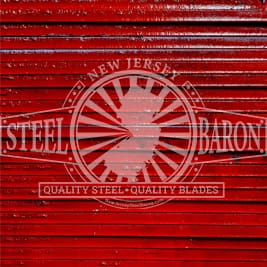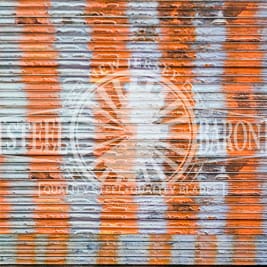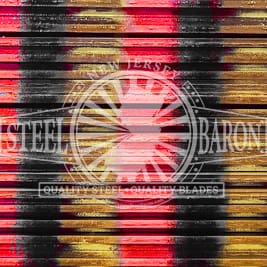Description
A favorite steel for many knife makers and enthusiasts, our 1095 has earned a respected reputation as being excellent for forging, grinding, and taking a wonderful edge.
Overall, 1095 does prove to be a little more difficult to heat treat for some makers as it is hyper-eutectoid and best used with an accurate means of reading temperature and a fast quench oil (we recommend Parks 50).
Those that have mastered heat treating 1095, however, have produced some of the most beautiful hamons.
We’ve kept our 1095 a constant simple recipe so that makers can get consistent, steady results from first to last over their many years making knives and tools.
While it may seem a little pricey, our 1095 is the best in the industry hands down due to the fact it provides easily predicted results each time, every time.
Like most of our steels it is pickled and annealed, so it arrives to you ready to go whether you use it in damascus or grind out a quick kitchen knife.
Like all high carbon steels, rust or stains can happen, be sure to inform your customers they’ll need to use good maintenance so as to not ruin the finish or to allow a natural patina to form over time, especially kitchen cutlery.
Only logged in customers who have purchased this product may leave a review.
Heat Lot Certifications
Listed below are our current LIVE and the most recently CLOSED material lot certifications per thickness:
| Previous | Current |
|---|
| 1095 .070 (1/16”) | N/A | 1247 |
|---|
| 1095 .094 (3/32”) | N/A | 1143 |
|---|
| 1095 .125 (1/8”) | N/A | 1450 |
|---|
| 1095 .156 (5/32”) | N/A | 1296 |
|---|
| 1095 .187 (3/16”) | N/A | 1258 |
|---|
| 1095 .250 (1/4”) | N/A | 1103 |
|---|
| 1095 .375 (3/8”) | N/A | 1099 |
|---|
1095 Heat Treat
You can download our 1095 Heat Treat PDF. It contains all of the information mentioned below.
Normalization
- Normalization is a process intended to refine grain and stress relieve blades prior to hardening when needed.
- Turco, ATP-641, foil, or similar may be used to reduce surface decarburization and scaling.
- Time at temperature suggested for varying thicknesses. Once knife has cooled to black and magnetic, it can be cycled again–be careful handling hot blades.
| 1st Cycle |
2nd Cycle |
3rd Cycle |
1,650°F / 898°C
Hold 10-15 minutes |
1,500°F / 815°C
Hold 10-15 minutes |
1,350°F / 732°C
Hold 10-15 minutes |
Hardening
- ATP-641, Turco, or similar high temperature anti-scale/decarburization coatings can be used to reduce scale or surface decarburization.
- Data is representative of controlled heat treating equipment (e.g. oven, salts, etc.) temperatures and industrial standard quenchant.
- Suggested quench oil: Parks 50–expected as quenched hardness may be lower if a slower quench oil or non-industrial quench medium is used.
- Austenizing soak time varies 5 to 15 minutes based on heat treating equipment and cross section–soak times are reduced to minimum for people heat treating in a forge–forge heat treating without PID temperature control limits accurate means of maintaining temperature. If using calibrated, proper industrial equipment for heat treating, use the supplied extended soak times based on over all steel thickness.
- Do not put blades in oven when cold, insert at or just below austenizing temperature–temperature variances is for difference in stock thicknesses and a window of margin for error.
| Austenizing Temperature |
Expected RC (as quenched) |
1,450-1,475°F / 788-804°C
Soak 5-15 minutes |
64-65RC |
Tempering
- Once blade is quenched and near ambient temperature, blades should be tempered accordingly, the times suggested are to ensure even, consistent temperature.
- Figures supplied are as representative of industrial standards.
- If using a small toaster oven or household kitchen oven for tempering, using a blade holding rack made from kiln furniture, a roasting tray lined with fine sand, or similar large object will help retain thermal mass to reduce wide swinging temperatures as the device fluctuates trying to maintain temperature.
- Note: Final hardness values vary based on initial as-quenched hardness and percentage of conversion to Martensite. Only reliable testing methods, e.g. calibrated Rockwell hardness tester, can provide actual hardness values–hardness calibrated files and chisels are relative testing methods and inaccurate for true hardness value reading.
- Temper twice for 2hrs.
- The included Heat Treat Schedule on this page is formulated based upon Industry standards and data from ASM International, Crucible and other foundry spec sheets, and Kevin Cashen (independent researcher, ferroalloy metallurgist, and bladesmith of Matherton Forge).
| Temperature |
Hardness (2 hour x2 guideline) |
| 300°F / 149°C |
65 |
| 350°F / 177°C |
63-64 |
| 400°F / 204°C |
60-61 |
| 450°F / 232°C |
57-58 |
| 500°F / 260°C |
55-56 |
| 550°F / 288°C |
53-54 |
| 600°F / 316°C |
52-53 |
| 650°F / 343°C |
50 |
Heat Treating Disclaimer
- Suggested heat treatment are based on the recommended specifications for use in ovens, high temp salts, and similarly, properly calibrated equipment; and in line with proper industrial standards for quenching. Deviation from industry standards for schedules, equipment, quenching mediums; and hardness testing equipment may result in varied results. The supplied information on this page is on a generalized scale with the above mentioned standards and methods, which is why soak times and similar aspects may vary in time length to include a margin for the available heat treating equipment and steel cross section.
- If you are unsure if you have the necessary means to heat treat on-site, we recommend professional heat treating services provided by Peters Heat Treat or Bos Heat treating; or industry specific services by knife material dealers such as TruGrit or Texas Knifemaker’s Supply–check with suppliers to see if they offer HT services and ensure they follow industry standards.
- NJSB LLC is not liable or responsible if proper industry heat treating protocols are not applied; particularly and especially if sending to an independent heat treat provider if they do not follow the intended heat treat schedule or standards for that particular steel; or damage they cause while in their possession.








Mcp2020 (verified owner) –
Order arrived in a timely manner. Steel was perfect for forging and worked very well.
mountainhighknives (verified owner) –
Great quality. Very consistent batch to batch for heat treatment. I’ve been using this company for 4 years now great quality and good service.